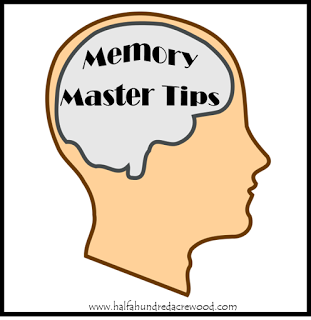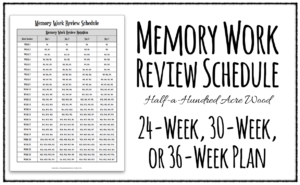Over the years, I’ve had other families ask about how we review memory work, especially as it relates to Memory Master Proofing each spring. Let me be upfront and mention that after almost a decade of sending our children successfully through the Memory Master process, we found that the end result of those particular efforts was not worth the time we had invested, especially as we moved through the Challenge program. That’s not to say memorization is unimportant. Although the process of officially becoming a Memory Master did not prove beneficial to our family in the long-run, we still focus on the art of memorization with poetry & speeches, hymns, scriptures, geography, and math facts. For those who participate in the Memory Master process, here are some tips and tricks that helped our children to achieve the official Memory Master award.
Memory Master Tips
Tip #1: Start memorizing Weeks 21-24 over winter break. Introduce Week 21 this week, Week 22 next week, and so on. When proofing rolls around this spring, you’ll be glad you’ve already mastered the last four weeks of material!
Tip #2: I encouraged all my children to at least attempt the parent proof. Because the parent proof can be done in the privacy of your home, you can easily use it to encourage and train your children in the early part of the process! We use this Memory Work Sticker Book, which can be laminated as a set of charts so you can reuse it. The spaces are big enough for pennies, M&Ms, Skittles, stickers, and other little treats. {All of our children liked “proofing” in this manner.}
Tip #3: I always feared what might happen if a child passed the parent proof but didn’t pass a subsequent one. So… we planned a special trip for our children to reward the effort, and we unveiled it if they didn’t pass a proof (or when they passed the director proof if they make it through the entire process). The reward need not be expensive – a special family outing for a dessert at the local McDonald’s can make a child feel special.
Tip #4: Give your children prompts in different orders. Work backwards through the history sentence prompts (Week 24 to 1), or give them a random timeline prompt to see if they can proceed from that point forward. They’ll need to be able to proof with the director on just a sample of the memory work. If they are used to always starting at week 1 and proceeding through the memory work in order, it may confuse them if they are told to start the timeline at “Jesus the Messiah.” For extra timeline practice, take a look at Timeline Thumbnails.
Tip #5: Use a variety of memory work techniques. Switch it up to keep it interesting.
- Picture/sound cues for Latin
- For memorizing multiplication facts, you might try Multiplication Fact Songs through the 15s.
- Geography Stories: “I poked my eye in Ireland, and then went to sing for the queen in England. I then sailed to the port in Portugal, and met a bullfighter with a pain in Spain. Then I lost my pants in France.” (Our second son David made up stories like this for memorizing geography.)
- Mnemonics
- Flash cards and File Folder Games for Latin | for English Grammar
- Other memory work practice techniques
If it gets dull, throw in some review games. Our favorite is this LEGO game, but you can also use games like Candyland, Ants in the Pants, or Don’t Break the Ice. (Just ask the memory work question before they take their turn!)
Tip #6: Print an extra map to place in a page protector (or laminate) and store it in your car for when you’re on the road. We practice quite a bit of our memory work in the car listening to CDs. If you have a map, you can use that time to review all seven (or eight) subjects, including geography!
Tip #7: At times we had to take breaks from our memory work to help us regain motivation and enthusiasm. Sometimes our break lasted a month. During that break we still came across the memory work in our everyday reading (or museum-going), but we allowed ourselves the freedom to take a brain break. If you find that it’s causing a high amount of stress in your home, it really is time to take a break.
Tip #8: Resist falling into the trap of comparison, and remember to choose joy. Learning can be hard, but it’s also exciting and rewarding. If you’re filled with a sense of dread as you enter this time of year, or if you’re having to give up things that you know are more important, it’s time to change what you’re doing. Do what’s best for your family, regardless of what others say.
How we reviewed memory work
Many people use a system like our Memory Rings or the downloadable flashcard computer program Anki. In fact, this is the basis for our Memory Work Review Schedule, which we’ve incorporated into each of our planners (Cycle 1 | Cycle 2 | Cycle 3).
For the past few years, however, we selected a memory work focus each day of the week where we reviewed ALL the material to the current date (and threw in the last 4 weeks of material as we got closer to Week 21). It went something like this:

While this is not the most exciting way to review memory work, it’s still a way that has worked for us for the past several years, and we still continue to default to this system of reviewing memory work to this very day!
Now it’s your turn! Do you have any Memory Master tips to share? Please share in the comments!


